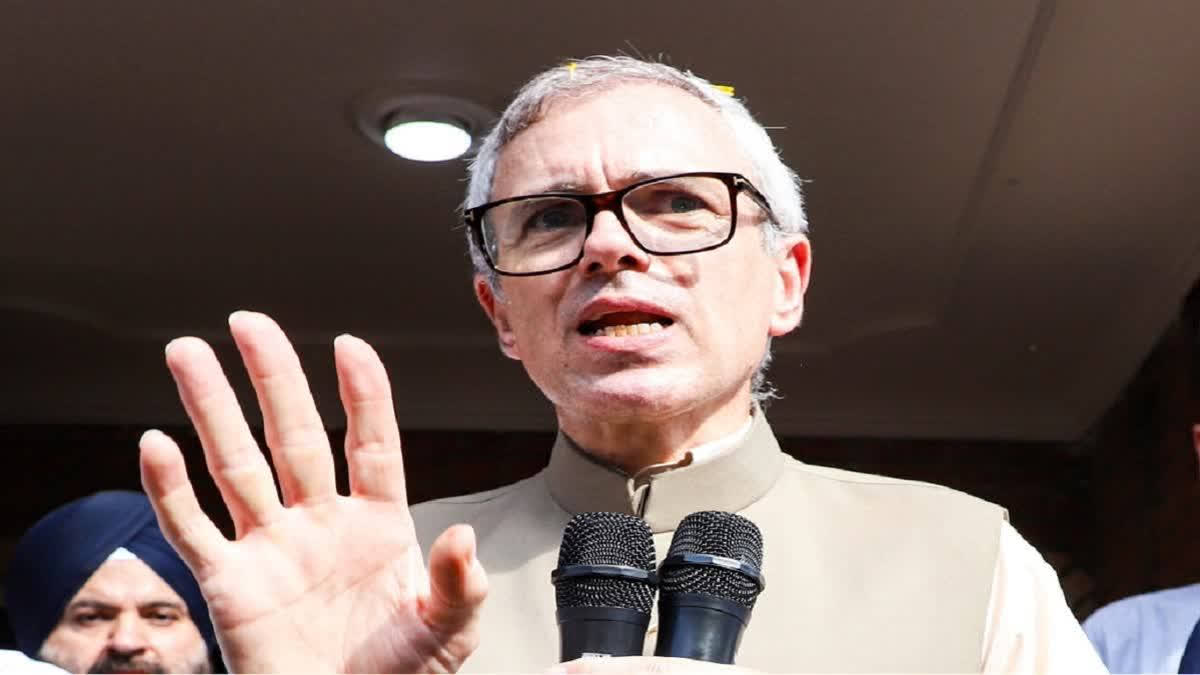Srinagar: For more than one reason, it will be a defining moment for National Conference vice-president Omar Abdullah. For one, he will be the first Chief Minister of the Union Territory of Jammu and Kashmir after the Bharatiya Janata Party-led government abrogated Article 370 and downgraded it into two Union Territories in 2019.
Additionally, Omar Abdullah will lack the full-fledged powers of the Chief Minister he once enjoyed when he took over the reins of the state for the first time in January 2009. It is also the first time, the home department, which controls the Jammu and Kashmir Police will be out of his domain, leaving him with negligible powers over significant security issues in the border state.
The Assembly's tenure was previously six years during Omar Abdullah’s regime when he became the youngest chief minister at the age of 38. Additionally, he will not serve as the full-fledged Chief Minister of the erstwhile Jammu and Kashmir, as Ladakh has been carved out as a separate Union Territory.
Yet Omar is readying to wear ‘the crown of thorns’ on the banks of Dal Lake at Sher-e-Kashmir Convention Centre on October 16. The mega facility was turned into a sub-jail for detaining political leaders in anticipation of any protest against the demotion of the erstwhile state in 2019.
The third-generation Abdullah, who joined politics in 1998, has been through challenges, including the latest loss in the Lok Sabha election to Engineer Rashid from the Baramulla constituency in June 2024. He lost his first election in 2002 from Ganderbal, which has elected three-generation Abdullahs to the Assembly. Yet, he relied on the same constituency again alongside Budgam this time when he was battling more challenges, including his allegation against New Delhi’s plans to defeat him through jailed people.
But, Omar was confident of sailing through when he unveiled the manifesto of the National Conference titled ‘Dignity, Identity and Development’ in Srinagar on August 19 promising statehood besides 12 guarantees. This was evident in his optimism about forming the government by dismissing several ‘ifs’ and ‘buts’. For some, the confidence stemmed from an ‘underhand’ deal with the Centre.
But, the decisive mandate declaring the National Conference the largest party with 42 elected legislators in the just concluded Assembly has cleared the misgivings, silencing his detractors. On the other hand, the BJP, which was a key party to upset the NC's plan, will sit in the Opposition with 29 legislators from Jammu alone. The saffron party failed to open its account from the 19 constituencies it contested in the Muslim majority Valley’s 47 constituencies.
Alongside his council of ministers, Omar will be the 14th Chief Minister of Jammu and Kashmir, ending the six years of direct Central rule of New Delhi. The President’s rule was imposed in J&K after the fall of the coalition government led by the Peoples Democratic Party and Bharatiya Janata Party in June 2018. Later, it was extended once the Modi-led government abrogated Article 370 and downgraded the state into two Union Territories.
Now with decks cleared for the first elected government, the Ministry of Home Affairs in a notification revoked the President’s rule on October 11 clearing the path for Omar to take over. But, Omar is acutely aware of the challenges waiting ahead. This was evident in his election campaign speeches wherein he would highlight the disempowerment of the Assembly, making people aware of the limitations of the next government.
The major share of legal and administrative powers lies with the Lieutenant Governor. This came through an amendment in the ‘transaction of business’ rules, sub-rule 2(A) of Section 55 of the Jammu and Kashmir Reorganisation Act, 2019. These include decisions on transfers and postings of IAS and IPS, the J&K Police, law and order and the appointment of judicial officers, including the advocate-general. The new rules also expand the control of the LG over the Anti-Corruption Bureau, prisons and prosecution and filing of appeals.
Besides, the appointment of the J&K Home Secretary, a key person in the administration, was vested with the state Home Ministry; Clause B of Sub-Rule 3 of Rule 50, which called on the LG to make a 'prior reference' to the Union Home Ministry on the appointment of the Chief Secretary and J&K Director General of Police (DGP) was earlier amended allowing the Centre’s nod in the appointment of the Home Secretary as well.
But, he did not hide it from the electorate. In the remotest corner of Damhal Hanjipora constituency in Kulgam last month, for example, he openly told the large crowd about the truncated powers of the next government. “We are seeking votes for the Assembly,” says Omar. “But it does not have the power we need. But NC and its alliance partners will make the assembly powerful again, Insha Allah.”
Many within his party as well as outside believe Omar’s plain speaking resonated with the electorate, propelling them to trust the party. For the first time, a regional political party in Jammu and Kashmir has crossed the 40 mark since 1996 when the same NC won 57 seats. Since then, the parties, including its political bete noire Peoples Democratic Party (PDP), reached the highest 28 seats.
A senior policy analyst ascribes the party’s electoral success to Omar for posturing his party to be the only force against the BJP’s plan. Being articulate, he alongside the NC MP Agha Ruhullah amplified the disempowerment of the people post-2019, propelling them to power.
National Conference newly elected legislator Hasnain Masoodi attributes the party’s success to Omar’s ‘realistic’ approach. The Former member of Parliament and retired justice of J&K High Court, who was one of the members of the party’s manifesto panel argues that Omar did not want to promise anything, which was beyond their domain. “Sometimes, we would go the extra mile, but he would advise us to be realistic in promises,” Masoodi told ETV Bharat.
Many in the party suggested announcing 500 free units of electricity for consumers as they are struggling to pay their power bills. But Omar would suggest the panel adhere to deliverable promises, making them reduce it to only 200 units. “Omar does not believe in populism alone. He led us in the elections despite many challenges and now he will lead us in the government as well. I am sure we will overcome all the challenges given that he is the best person to deliver and lead us,” says Masoodi.
His detractors held onto his past term, including months-long protests and curfews leading to a series of killings in Kashmir. But, his close confidants argue he has ‘acclimatised’ himself with the ground situation particularly after he alongside his father and NC president Farooq Abdullah was booked under the Public Safety Act in 2019.
“Omar experienced and lived what his grandfather Sheikh Sahib may have been through when he was jailed,” he adds. “He is politically mature and has age on his side, unlike the previous term when he was young. Now, he has got numbers on his side well. All these things make him more equipped for the challenges ahead and deliver.”
Outside the party, too, MY Tarigami, who was elected to the Assembly for the fifth term on the ticket of the Communist Party of India (M), describes Omar as ‘dynamic’ and ‘young’. It seems people as well as his party trust him, according to him, in the face of the mandate as well as the support he got for the chief ministership. “Now we all have to come up to the expectations of the people,” adds Tarigami, who is an alliance partner of the government. For that enormous challenge and responsibilities, Omar's reconciliatory tone with New Delhi after the electoral victory is an indication of his plan.
Read more: Akhilesh Lands In Srinagar For Omar's Swearing-in, Urges Statehood For Jammu And Kashmir



